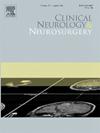Emergent role of complement inhibitors in myasthenic crisis: Understanding why, when and how
IF 1.8
4区 医学
Q3 CLINICAL NEUROLOGY
引用次数: 0
Abstract
We report the case of a 32-year-old woman with an 11-year history of thymomatous AChR antibody-positive generalized myasthenia gravis (gMG, MGFA IIIb) who experienced a myasthenic crisis (MC) during the postpartum period, requiring mechanical ventilation (MV). Initial treatment with therapeutic plasma exchange (TPE) and high-dose prednisone was ineffective, and pyridostigmine worsened airway secretions. Due to contraindications for IVIg, she was treated with the complement inhibitor eculizumab, following prophylactic meningococcal vaccination and antibiotic therapy. Six days after starting eculizumab, the patient showed marked improvement in muscle strength, respiratory function, and was successfully extubated. She was discharged from the intensive care unit (ICU) and continued bi-weekly Eculizumab infusions without adverse events. A systematic literature review identified 19 additional cases of MC treated with eculizumab, examining response timing, treatment efficacy, adverse events, and follow-up data. This case, along with the literature review, supports the possibility of using anti-complement therapy in patients unresponsive to conventional therapies in MC setting.
补体抑制剂在肌无力危机中的紧急作用:理解为什么,何时以及如何
我们报告了一例32岁的女性,患有胸腺瘤性AChR抗体阳性的全身性重症肌无力(gMG, MGFA IIIb) 11年的病史,她在产后经历了重症肌无力危象(MC),需要机械通气(MV)。治疗性血浆置换(TPE)和大剂量强的松初始治疗无效,吡哆斯的明加重气道分泌物。由于IVIg的禁忌症,在预防性脑膜炎球菌疫苗接种和抗生素治疗后,她接受了补体抑制剂eculizumab治疗。开始使用eculizumab 6天后,患者肌肉力量、呼吸功能明显改善,并成功拔管。她从重症监护病房(ICU)出院,并继续每两周输注Eculizumab,无不良事件。一项系统的文献综述确定了另外19例使用eculizumab治疗的MC病例,检查了反应时间、治疗疗效、不良事件和随访数据。该病例和文献综述支持在MC环境中对常规治疗无反应的患者使用抗补体治疗的可能性。
本文章由计算机程序翻译,如有差异,请以英文原文为准。
求助全文
约1分钟内获得全文
求助全文
来源期刊

Clinical Neurology and Neurosurgery
医学-临床神经学
CiteScore
3.70
自引率
5.30%
发文量
358
审稿时长
46 days
期刊介绍:
Clinical Neurology and Neurosurgery is devoted to publishing papers and reports on the clinical aspects of neurology and neurosurgery. It is an international forum for papers of high scientific standard that are of interest to Neurologists and Neurosurgeons world-wide.
 求助内容:
求助内容: 应助结果提醒方式:
应助结果提醒方式:


